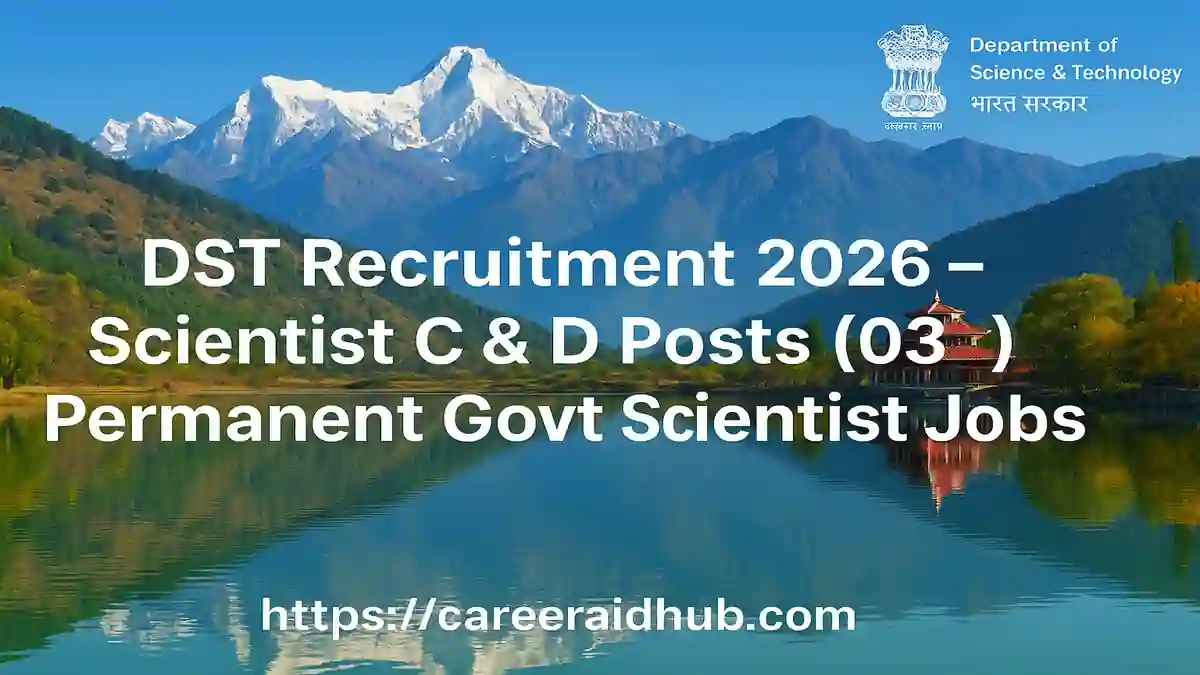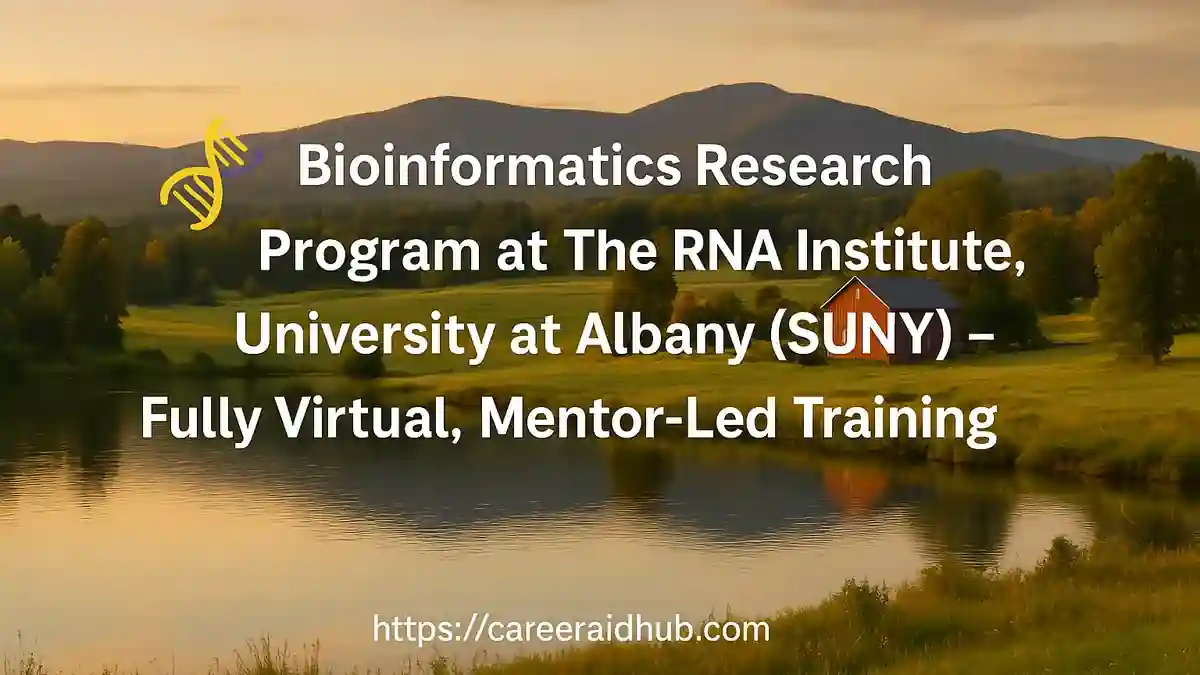Overview of DST Scientist Recruitment 2026
The Department of Science & Technology (DST) under the Ministry of Science & Technology, Government of India, has released Advertisement No. DST/06/2025 – Estt.III to recruit three permanent Scientist posts through direct recruitment. These scientist positions form part of the DST Group ‘A’ Gazetted Scientific and Technical cadre and are based at Technology Bhavan, New Mehrauli Road, New Delhi.
DST Recruitment 2026 opens three permanent Scientist posts in New Delhi for experienced engineers and researchers seeking stable central government scientist careers. These Group ‘A’ Gazetted roles under DST offer long-term growth, attractive pay, and a strategic opportunity to contribute to India’s science, technology and innovation agenda at the national level.
This DST Scientist Recruitment 2026 drive aims to strengthen in-house expertise in key strategic domains: Electronics & Communication Engineering, Biological Sciences / Biotechnology, and Materials / Metallurgical Engineering. Selected candidates will support national missions, evaluate and monitor R&D projects, and contribute to policy-linked programmes that shape India’s science and technology landscape.
Application Timeline and Mode
According to the official time-line, the advertisement appeared in Employment News dated 15 November 2025. The online application portal for DST Scientist C and D recruitment 2026 opened on 16 November 2025 (00:00 hrs) and will close on 14 January
2026 (23:59:59 hrs). Candidates must apply online only through the DST recruitment portal; no offline, postal or email applications are accepted.
Vacancy Details – 03 Scientist Posts
Total Number of Posts: 03
Nature of Posts: Permanent, Group ‘A’ Gazetted, Scientific & Technical
DST is filling two Scientist ‘C’ posts and one Scientist ‘D’ post across three specialized disciplines. Each role combines programme management, technical evaluation and policy support, rather than focusing solely on laboratory-based research.
Scientist ‘C’ – Electronics & Communication Engineering (01 Post)
-
- Discipline: Electronics & Communication Engineering
- Pay Level: Level-11 in the Pay Matrix (₹67,700 – ₹2,08,700)
- Core Responsibilities:
- Appraisal and monitoring of projects in electronics, communication and allied areas.
- Coordination of national-level initiatives in communication technologies, devices, embedded systems and related fields.
- Providing technical inputs for policy documents, guidelines and scheme frameworks linked to electronics and ICT missions.
This vacancy is ideal for candidates looking for a permanent government scientist job in electronics and communication with strong exposure to national R&D programmes.
Scientist ‘C’ – Biological Sciences / Biotechnology (01 Post)
-
- Discipline: Biological Sciences / Biotechnology
- Pay Level: Level-11 in the Pay Matrix (₹67,700 – ₹2,08,700)
- Core Responsibilities:
- Managing programmes in
life sciences, biotechnology, health and agriculture-oriented innovation.
- Technical review of project proposals, including experimental design, milestones, deliverables and budget justification.
- Facilitating inter-disciplinary and inter-institutional collaborations across universities, research institutes and industry partners.
This post suits applicants interested in DST life sciences and biotechnology recruitment with a focus on programme management and scientific evaluation.
Scientist ‘D’ – Materials / Metallurgical Engineering (01 Post)
-
- Discipline:
- Materials Engineering, or
- Materials Science & Engineering, or
- Metallurgical Engineering
- Pay Level: Level-12 in the Pay Matrix (₹78,800 – ₹2,09,200)
- Core Responsibilities:
- Higher-level planning and supervision of programmes in materials and metallurgical engineering.
- Supporting advanced materials, structural metals, functional materials and energy-related materials research.
- Liaison with industry and strategic sectors to align DST-funded programmes with national priorities and technology needs.
This vacancy is particularly relevant for those seeking DST Scientist D materials and metallurgical engineering posts with leadership responsibilities in R&D policy and programme oversight.
Essential Qualifications & Experience
The official advertisement sets out detailed qualification and experience requirements for each Scientist post. Candidates should read those conditions carefully before applying, as the screening committee will strictly rely on the notified criteria during DST Scientist Recruitment 2026 shortlisting.
Scientist ‘C’ – Electronics & Communication Engineering
Essential Educational Qualification
justify;">
A Bachelor’s Degree (minimum four-year degree course) in Electronics & Communication Engineering or an equivalent discipline from a recognised University or Institute.
This requirement ensures that applicants possess a strong foundation in core ECE topics such as signals and systems, communication theory, microelectronics, embedded systems and digital communication. Such preparation is crucial when assessing complex project proposals and national programmes in electronics and communication.
Desirable Qualification
-
- A Master’s Degree in Electronics & Communication Engineering or equivalent.
A postgraduate qualification can strengthen a candidate’s profile by demonstrating advanced competence in specialized areas such as VLSI design, wireless communication, optical networks or signal processing. These fields often feature in high-level R&D proposals and national technology missions handled within DST.
Essential Experience
-
- At least four years of experience in Research & Development in an Industry, Academic Institution or Science & Technology Organisation after acquiring the essential degree.
Experience should be clearly documented through formal appointment letters and experience certificates indicating the period of employment, designation, pay level and broad nature of duties. Work involving project design, technology development, prototype creation, field deployment or coordination of funded projects will typically receive higher weightage than purely routine operational
tasks.
Scientist ‘C’ – Biological Sciences / Biotechnology
This position can be filled from either the Biological Sciences stream or the Biotechnology stream, with slightly different educational pathways but a common focus on DST Scientist C eligibility in life sciences and biotechnology.
(a) Biological Sciences Stream
Essential Educational Qualification
-
- Master’s Degree in Biological Sciences or an equivalent degree from a recognised University/Institute.
The term “Biological Sciences” broadly covers disciplines such as microbiology, biochemistry, molecular biology, cell biology, zoology, botany and closely allied fields, provided the degree is awarded by a recognised institution.
Desirable Qualification
-
- Doctorate (PhD) in Biological Sciences or an equivalent discipline.
A completed PhD is particularly valuable when dealing with complex life-science projects, multi-institutional consortia or translational research proposals that require nuanced scientific judgement and critical evaluation skills.
(b) Biotechnology Stream
Essential Educational Qualification
-
- Bachelor’s Degree (minimum four-year degree course) in Biotechnology or an equivalent branch from a recognised University/Institute.
This pathway ensures that candidates have a solid grounding in genetic engineering, bioprocess technology, bioinformatics and related subjects that underpin modern biotechnology and health-tech innovation.
Desirable Qualification
-
- Master’s Degree in Biotechnology or equivalent.
A higher degree helps demonstrate deeper conceptual understanding and exposure to sophisticated laboratory techniques, experimental design and data analysis approaches that are frequently encountered in DST-funded biotechnology projects.
Experience Requirement – Both Streams
For both Biological Sciences and Biotechnology pathways, candidates must demonstrate:
-
- Four years of post-qualification experience in R&D in an Industry, Academic Institution or S&T Organisation.
Experience may include PI or co-PI roles in funded projects, postdoctoral research, industrial R&D assignments, or positions in scientific organisations where candidates have handled independent or semi-independent responsibilities. For applicants targeting DST life sciences scientist jobs, a track record of peer-reviewed publications, patents or notable project outcomes will be advantageous.
Scientist ‘D’ – Materials / Metallurgical Engineering
Essential Educational Qualification
-
- A Bachelor’s Degree (minimum four-year degree course) in Materials Engineering, Materials Science & Engineering, or Metallurgical Engineering, or an equivalent qualification from a recognised University/Institute.
This covers programmes where materials or metallurgical engineering forms the core discipline, including specialisations such as physical metallurgy, process metallurgy, ceramics, polymers and composites, provided they meet the equivalence criteria defined by DST.
Desirable Qualification
-
- A Master’s Degree in any of the above disciplines or an equivalent field.
A postgraduate degree can significantly enhance the candidate’s ability to scrutinise advanced materials proposals involving, for example, high-temperature alloys, nanomaterials, energy storage materials, structural composites or additive manufacturing technologies.
Essential Experience
-
- Eight years of research and development experience in Industry, Academic Institution or S&T Organisation after the essential degree.
At this senior level, candidates are expected to have led or substantially contributed to major R&D projects, technology development programmes, standardisation initiatives or collaborative work with industry and strategic agencies. Professionals seeking DST Scientist D materials engineering recruitment should demonstrate an ability to manage complex programmes and guide long-term research directions.
Counting PhD Period as Experience
For both Scientist ‘C’ and Scientist ‘D’ posts, a part of the period spent on obtaining a PhD in the relevant discipline may be counted as experience, up to a maximum of two years, subject to specific conditions:
-
- The PhD must be formally awarded, and the degree award date should be clearly documented.
- The concerned University/Institute must certify the period that can be treated as research experience.
- No credit is given for incomplete or discontinued PhD work.
If a candidate was simultaneously employed in a full-time role and registered for a PhD, the actual employment period will typically be counted rather than the nominal PhD duration. Therefore, applicants should prepare precise and consistent documentation to support their experience claims under DST Scientist C and D eligibility norms.
Age Limit (as on Last Date of Application)
-
- Scientist ‘C’: Upper age limit 35 years
- Scientist ‘D’: Upper age limit 40 years
The upper age limit is relaxable by up to five years for Government servants in accordance with existing Central Government norms. Any other age relaxations (for example, for particular categories if notified) will follow standard rules as laid down by the Government of India.
These posts are explicitly stated to be outside the purview of reservation, which means that the advertised vacancies do not carry category-wise reservation. All candidates are therefore considered under a common merit list based on the selection criteria.
The crucial date for determining age, essential qualifications and experience is the closing date for online submission of applications, i.e., 14 January 2026. Documents submitted after this date, except for the No Objection Certificate (NOC) from present employers where specifically allowed, will not be considered.
Selection Process
The screening and selection process will follow the procedures prescribed by the Central Government and applicable DST recruitment rules. Candidates preparing for the DST scientist selection process should understand the following key elements.
- Eligibility-cum-Shortlisting Committee
- An expert committee will scrutinise applications based on essential and desirable qualifications, relevant experience, research output and alignment with the advertised discipline.
- Where a large number of eligible applications are received, the committee may apply additional criteria such as quality and impact of publications, project leadership roles, specialization areas or relevance of experience to the specific DST programmes.
- Written Test (If Conducted)
- DST may conduct a written test as a preliminary screening method before interviews.
- The pattern, syllabus and weightage—if adopted—will be notified separately or through call letters issued to shortlisted candidates.
- Interview by Duly Constituted Board
- Shortlisted candidates will be called for interview before an appropriate Interview Board.
- The Board will assess technical knowledge, breadth of understanding across the field, project appraisal skills, communication ability and overall suitability for a programme-management-oriented scientist role in central government.
- Merit and Disqualification
- Mere fulfilment of the minimum eligibility criteria does not guarantee an interview call.
- Candidates with stronger profiles—such as higher qualifications, demonstrable leadership in R&D, significant innovation outcomes or strong alignment with DST programme needs—may receive preference.
- Canvassing in any form can lead to disqualification at any stage of the process.
How to Apply – Step-by-Step
Applications are invited only through the online mode. Hard-copy submissions or email applications will not be entertained, so candidates should plan their DST scientist online application accordingly.
Online Application Process
-
- Access the Recruitment Portal
- Visit the official DST recruitment portal: https://recruitment.dst.gov.in.
- Register with a Valid Email ID
- Create a candidate account using a working email ID, as this will be used for all future communication regarding the DST Scientist C and D recruitment.
- Complete the Online Form
- Fill in personal details, educational qualifications, employment history and experience information carefully.
- Ensure that discipline/subject details correspond exactly to the advertised streams and match the details in your certificates.
- Upload Scanned Documents
- Educational certificates (degree certificates and mark sheets).
- Experience certificates clearly showing “from–to” dates, designation and pay level.
- Proof of date of birth.
- Category/disability certificates, if applicable under government rules.
- Additional documents such as a list of publications, patents, awards or major projects may also be uploaded, if space is provided in the portal.
- Review and Submit
- Cross-check all entries, particularly email, mobile number, dates and discipline codes, to avoid errors.
- Submit the form and retain a copy of the final submitted application or acknowledgement for future reference and interview preparation.
The recruitment portal remains live from 16 November 2025 until 14 January 2026 (23:59:59 hrs). It is strongly advisable to submit the application well before the closing date to avoid last-minute connectivity problems or server-load issues.
Important Application Guidelines
-
- Applications sent by post, courier, fax or email will be summarily rejected.
- Submission of hard copies is not required, unless explicitly requested at a later stage of the process.
- Candidates employed in Government/PSU/Autonomous organisations should follow their organisation’s procedures for obtaining an NOC; however, they may be allowed to submit the NOC at the time of interview if specified in the call letter.
- All uploaded documents must be legible and self-consistent; discrepancies between online entries and supporting documents can lead to rejection of the application.
Why This DST Scientist Recruitment is a Big Opportunity
Joining DST as a Scientist offers a unique blend of scientific depth, policy relevance and national impact that is rarely matched elsewhere in the Indian R&D ecosystem.
Key Advantages
-
-
Job Security and Status
These are permanent Group ‘A’ Gazetted posts. They offer long-term stability and clear service rules. They also provide strong recognition within the Government of India system. Therefore, they are an excellent option for professionals seeking permanent scientist roles in New Delhi.
-
Impactful Work at a National Scale
Scientists in DST design and monitor major R&D programmes and national missions. They also oversee key funding schemes across cutting-edge fields. As a result, their work shapes resource allocation, technology roadmaps and national innovation strategies.
-
Interdisciplinary Exposure
Officers regularly engage with leading researchers from academia, national labs, startups and industry. This interaction gives them a broad view of emerging technologies. It also exposes them to areas such as advanced materials, energy systems, biotechnology and communication technologies.
-
Career Growth and Leadership Pathways
The cadre provides structured promotions to higher Scientist grades. Over time, officers can lead divisions or guide national missions. They may also serve on high-level committees that shape science and technology policy and implementation.
Conclusion and Key Takeaways
The DST Recruitment 2026 – Scientist Positions (03 Posts) offers a rare chance to join India’s apex science and technology department. These are permanent Group ‘A’ roles, which makes the opportunity even more valuable. In addition, the eligibility criteria are clearly defined, allowing applicants to assess their fit easily. The pay scales are competitive, further strengthening the appeal. Moreover, the online application process is transparent and straightforward. As a result, the positions are an excellent career path for professionals in Electronics & Communication Engineering, Biological Sciences, Biotechnology, and Materials or Metallurgical Engineering.
At a Glance – DST Scientist Recruitment 2026
|
Feature
|
Details
|
|
Program Name
|
DST Scientist Recruitment 2026 – Scientist ‘C’ and Scientist ‘D’ Posts
|
|
Host Country
|
India (New Delhi, Department of Science & Technology)
|
|
Funded By
|
Department of Science & Technology, Ministry of Science & Technology, GoI
|
|
Duration
|
Permanent Group ‘A’ Gazetted posts
|
|
Study/Work Mode
|
Full-time, in-person scientific and technical positions
|
|
Eligibility
|
Experienced engineers/scientists meeting discipline-specific criteria
|
|
Financial Support
|
Pay Matrix Level-11 / Level-12 with central government allowances
|
|
Fields of Work
|
Electronics & Communication, Biological Sciences, Biotechnology, Materials / Metallurgical Engineering
|
|
Deadline
|
01/14/2026
|
|
Official Website
|
Click here
|
References
1.Department of Science & Technology – Advertisement for filling up the 02 posts of Scientist C and 01 post of Scientist D on direct recruitment basis (English PDF)
2.DST Online Recruitment Portal – Scientist C and Scientist D Direct Recruitment:
Frequently Asked Questions (FAQs)
What is DST Recruitment 2026 for Scientist C and D posts? DST Recruitment 2026 invites applications for three permanent Group ‘A’ Gazetted Scientist C and D posts in New Delhi, focusing on electronics, life sciences, biotechnology, and materials disciplines.
What are the eligibility criteria for DST Scientist C Electronics & Communication Engineering? Candidates must hold a four-year Bachelor’s degree in Electronics & Communication Engineering or equivalent and, additionally, possess at least four years of relevant R&D experience after graduation.
What is the eligibility for DST Scientist C Biological Sciences and Biotechnology posts? Applicants need either a Master’s in Biological Sciences or a four-year Bachelor’s in Biotechnology, plus, importantly, a minimum of four years of post-qualification R&D experience.
What is the eligibility for DST Scientist D Materials / Metallurgical Engineering? You must hold a four-year Bachelor’s degree in Materials, Materials Science & Engineering, or Metallurgical Engineering and, furthermore, have at least eight years of relevant R&D experience.
What is the age limit for DST Scientist C and Scientist D recruitment? For Scientist C, the upper age limit is 35 years; for Scientist D, it is 40 years. However, government servants receive permissible age relaxation as per rules.
What is the salary and pay level for DST Scientist C and Scientist D posts? DST Scientist C receives Level-11 pay, while Scientist D receives Level-12 pay. Additionally, both posts carry standard central government allowances and benefits under the 7th CPC structure.
Is research experience mandatory for DST Scientist C and D vacancies? Yes, DST requires post-qualification R&D experience: at least four years for Scientist C and eight years for Scientist D, although part of a completed PhD may count.
Will DST conduct a written exam for Scientist C and D selection? DST may conduct a written test for initial screening; however, final selection primarily depends on performance in the interview and overall academic and research profile.





